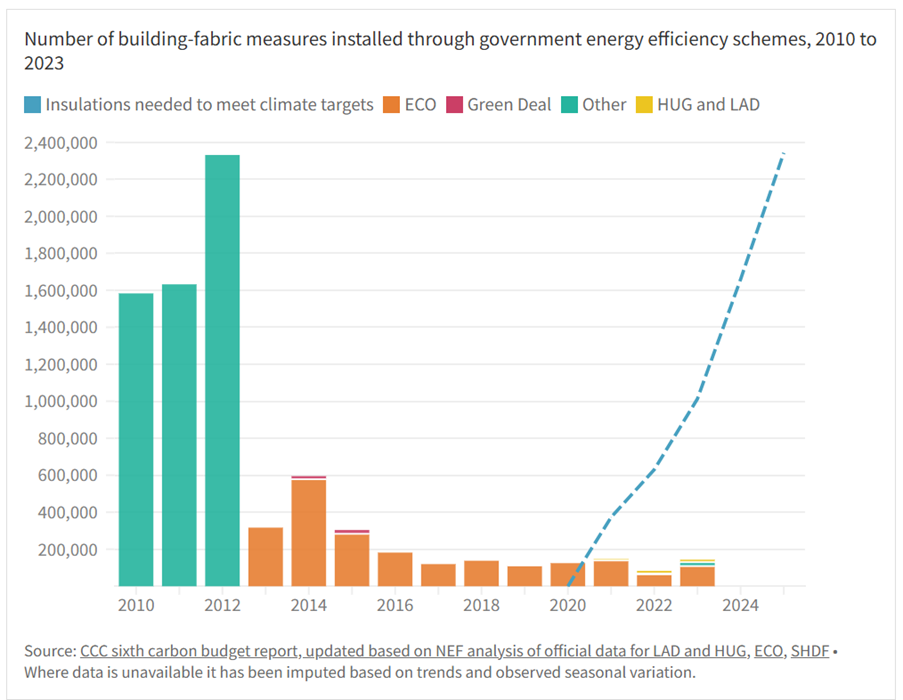
Dr. Mitya Pearson is an Assistant Professor at The University of Warwick.
Building energy efficiency policy in the UK represents something of a paradox.
On the one hand, the perceived lack of progress in installing energy efficiency measures in homes has been widely bemoaned in recent years. The famous chart showing the number of insulation measures installed in the UK falling off a cliff in 2013, and never recovering after that, is often produced in UK policy circles to underline this point.
On the other hand, the UK has been argued to be a ‘success story’ in terms of the energy demand reductions that it has achieved across its economy over an extended period. Additionally, while the UK Government has been repeatedly criticised for its lack of policy action on building energy efficiency, a closer look reveals that it has by no means simply been a case of nothing happening. In fact, the story of this policy area in the last 15 or so years has been quite a bumpy ride, including a big policy reorientation around 2013 and various false starts since then.

Source: New Economics Foundation
As part of some recent research, I adopted the former interpretation. I examined UK building energy efficiency policy between 2010 and 2024 as a case study of an important area of policy, vital for meeting climate change targets, where progress has been insufficient, and investigated the reasons for this inertia.
Some building energy efficiency improvements including the ECO scheme, which has run for a number of years now, and various actions in response to the post-Ukraine invasion energy crisis.
However, I depicted this period as one of hiatus in energy efficiency policy for three main reasons: (i) overall, across the 2010-2024 period, progress on building energy efficiency lagged expert assessments of what was necessary for the UK to meet its climate change targets; (ii) for most of the period (between 2013 and 2024) the amount of insulation being installed underperformed what had been achieved historically in the UK; (iii) for much of 2010–2024 there was very little policy development on building energy efficiency .
The research drew from 47 interviews with people with inside knowledge of UK government policymaking on energy efficiency.
The interviews sought to investigate why more successful policies were not brought forward to improve the efficiency standards of existing buildings in the UK during the period of study
The interviews highlighted a series of influential factors that together appear to have substantially constrained policy development. These can be summarised into a broad three-part argument.
Firstly, general political conditions were unhelpful for energy efficiency policy. British politics in this period was turbulent, and the Conservative Party-led governments in this period were arguably not predisposed to the types of government intervention often involved in energy efficiency policy schemes (though that is not to suggest that Conservatives are inherently against building energy efficiency).
Secondly, various aspects of energy efficiency policy made it unappealing to British policymakers, including its expense, and the negative perceptions created by the failure of initiatives such as the Green Deal and Green Homes Grant.
Finally, this area of policy interacted in unhelpful ways with the way policy is made in the UK, including inter-departmental disputes within Whitehall and government ministers’ often quite short-term incentives.
Exploring what held back UK energy efficiency policy development and delivery up to 2024 has useful lessons, both for the future of policy in this area and climate change action more broadly.
The need for rapid and deep policy shifts to deliver sustainable energy transitions is often emphasised, with a related idea that climate policy will involve experimentation, and trial and error.
If policy initiatives go wrong and get scrapped, however, this can trigger extended policy gaps. A key dynamic in this case was the sense of UK policymakers having their fingers burnt by energy efficiency schemes that were launched but did not deliver in the way that was hoped.
In general, significant policy change is also often understood by political scientists as occurring in brief ‘windows of opportunity’ which open up when political conditions allow.
Such dynamics were identifiable in energy efficiency policy in the 2010-2024 period, but were not very helpful. At some points, there were brief bursts of political interest in energy efficiency, leading to some action, but not what was really needed: a comprehensive and durable set of policy initiatives that could deliver sustained results over the long term.
These points suggest a potential trade-off in energy transitions between speed and the value of policy stability in enabling investment. It also further highlights the important role of feedback effects from policy initiatives in defining the trajectory and success of climate change mitigation policies.